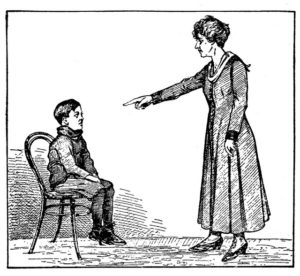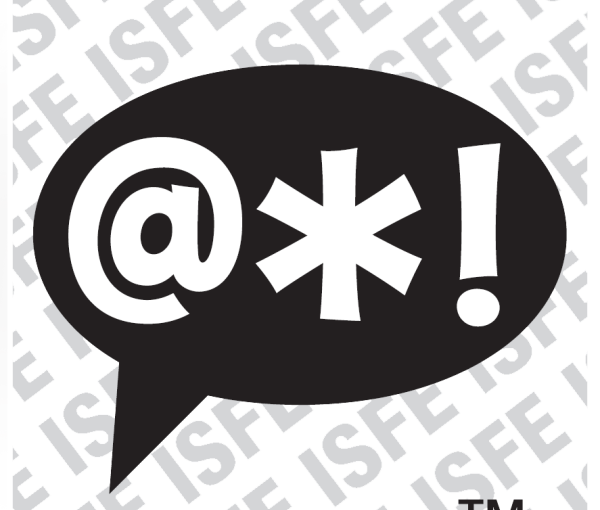One study (Scherer and Sagarin 2006) showed that using obscenity correctly actually increased the persuasiveness of a speech! However, if you want to be a great communicator, there is one four-letter word you must get out of your head forever.
If you have ever been to any of my presentations or public speaking classes, you know that there is one common piece of advice that I despise:
Tell ’em what you’re gonna tell ’em. Tell ’em. Then, tell ’em what you told ’em.
Here’s just one of the many reasons why …
The worst four letter word
What is the most fun you can imagine? What activity could you do this Friday that would lift your spirits? What would make you smile?
I can’t wait. I’m going to go sit in a room and listen to someone tell me something.
Let me guess. That isn’t what you imagined. Public speaking is not what most people consider a “good time.”
 Better yet, imagine you’re 13 years old and your mother sternly calls you to the kitchen:
Better yet, imagine you’re 13 years old and your mother sternly calls you to the kitchen:
Get in here. I have to tell you something.
Does that sound like a lecture that the thirteen-year-old you wants to attend?
What if your lover quietly approaches you and says:
We have to talk … I need to tell you something.
Are you looking forward to what she/he has to say?
“Telling” is usually a punishment!
You see, TELL is a four letter word of the worst kind. If you follow the typical advice you “tell ’em what you’re gonna tell ’em” and then you “tell ’em” and then you add insult to injury by “telling ’em what you told ’em.”
I hate to tell you this but if you approach a presentation as a medium to “tell” the listener something, then you are mind-numbingly BORING. Nobody likes to be “told” off.
TELLING is not anywhere on the list of essential presentation skills.
The alternative
If you want to tell them something, write a book. If you want to be a great speaker, a great teacher, or an influential leader, then you have to learn better presentation skills.
Let’s work through each of the 8 SpeechDeck principles and find an alternative communication technique.
C Clarify Your Content
 The Content principle is the telling part. That’s why it’s “black and white.” Just remember the point of this principle is not to tell just for the sake of telling. The point is to clarify it so well that the listener can remember.
The Content principle is the telling part. That’s why it’s “black and white.” Just remember the point of this principle is not to tell just for the sake of telling. The point is to clarify it so well that the listener can remember.
For the following examples, let’s suppose I want to tell you this black and white message:
People should brush their teeth every day.
Nobody wants to be “told” to brush their teeth, even if they need to be told. The principles of color are where we see the real alternatives.
A Inject Anticipation
Creating anticipation is exactly the opposite of “telling.”
You can tell ’em WHY you’re gonna tell ’em. You can tell ’em HOW you’re gonna say it. You can even tell ’em what you’re NOT going to say. Just don’t tell ’em WHAT you’re gonna tell ’em.
Let’s create a transition or introduction that is a WHY statement that withholds the message we want to tell:
Let’s talk about a way to improve your reputation, improve your health, and improve your relationships.
Suddenly, nobody is being “told off,” and the audience actually wants to listen.
R Develop Relationships
The relationship principle is all about finding common ground. Phrase your “tell” as something that is a group norm:
Everybody in this room shares the same 2 minutes every evening … We all brush our teeth.
If they already brush their teeth at night, you’ll bond. If they don’t, they will want to, because everybody else does. In other words, don’t tell–share!
M Reveal the Messenger
Revealing part of yourself takes the pressure off the listener. You’re not telling them what they should do, you’re revealing WHY you care.
One time I went to the dentist and it cost me a $600 surprise. I want to save you my misfortune.
P Encourage Participation
Telling is a one way lecture from speaker to audience. Participation works the other way, get the audience to do the telling.
Raise your hand and tell the group what you think is the best reason to brush your teeth.
Participation means you can command, ask, or incentivize the audience to do the talking–and comply.
I Empower the Individual
To empower someone, you must get personal.
Imagine you have molars removed. Imagine you stare into your loved ones face with missing teeth. Imagine you have a $3,000 bill for just one false tooth. Imagine you have bleeding gums and you can’t chew your favorite meal.
When it’s personal, you don’t have to tell ’em. They tell themselves.
T Manage the Theater
Use the space in your theater to show pictures, videos, and physical demonstrations:
Look at this picture of an abscessed tooth.
Don’t tell em, show em.
A Engage the Subconscious
A subconscious impression cannot result from telling mere words, only from real experience. That means that after any of the above examples you have to stop talking long enough for the listener to feel it.
The best four letter words
Unfortunately, good public speaking does require some amount of “telling.” I can’t ask you to eliminate telling all together. However, I do ask you to approach your presentations differently.
 If your goal is to “tell,” then success will mean the best compliment you receive will be that you “told” something. You must think of TELL as a four letter word. Change your goal, and you will change everything.
If your goal is to “tell,” then success will mean the best compliment you receive will be that you “told” something. You must think of TELL as a four letter word. Change your goal, and you will change everything.
As a teacher, leader, public speaker or presenter, don’t walk into the room with the goal of telling the audience anything. Walk into the room with a plan to hint, contradict, tease, share, reveal, ask, command, incentivize, compliment, personalize, show, demonstrate, experience, and feel–anything but tell.
By the way, the study referenced earlier (Scherer and Sagarin 2006) showed that using obscenity briefly at the beginning or end of a speech increases persuasiveness, increases the perception of the speaker’s intensity, and has no effect to lessen the speaker’s credibility.
If you want to be a great communicator–damn it–you’re better off swearing at your audience than just “telling” them something!

